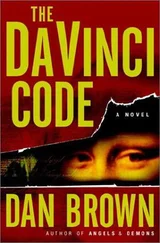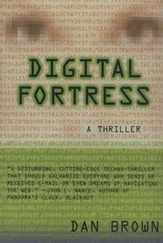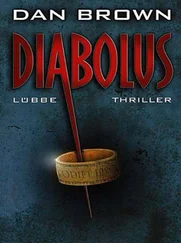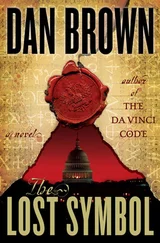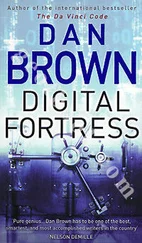As the video ended, Langdon recognized Zobrist’s final words as a near duplicate of Dante’s final words in the Inferno .
In the darkness of the conference room, Langdon realized that all the moments of fear he had experienced today had just crystallized into a single, terrifying reality.
Bertrand Zobrist now had a face … and a voice.
The conference room lights came up, and Langdon saw all eyes trained expectantly on him.
Elizabeth Sinskey’s expression seemed frozen as she stood up and nervously stroked her amulet. “Professor, obviously our time is very short. The only good news so far is that we’ve had no cases of pathogen detection, or reported illness, so we’re assuming the suspended Solublon bag is still intact. But we don’t know where to look . Our goal is to neutralize this threat by containing the bag before it ruptures. The only way we can do that, of course, is to find its location immediately.”
Agent Brüder stood up now, staring intently at Langdon. “We’re assuming you came to Venice because you learned that this is where Zobrist hid his plague.”
Langdon gazed out at the assembly before him, faces taut with fear, everyone hoping for a miracle, and he wished he had better news to offer them.
“We’re in the wrong country,” Langdon announced. “What you’re looking for is nearly a thousand miles from here.”
* * *
Langdon’s insides reverberated with the deep thrum of The Mendacium ’s engines as the ship powered through its wide turn, banking back toward the Venice Airport. On board, all hell had broken loose. The provost had dashed off, shouting orders to his crew. Elizabeth Sinskey had grabbed her phone and called the pilots of the WHO’s C-130 transport plane, demanding they be prepped as soon as possible to fly out of the Venice Airport. And Agent Brüder had jumped on a laptop to see if he could coordinate some kind of international advance team at their final destination.
A world away.
The provost now returned to the conference room and urgently addressed Brüder. “Any further word from the Venetian authorities?”
Brüder shook his head. “No trace. They’re looking, but Sienna Brooks has vanished.”
Langdon did a double take. They’re looking for Sienna?
Sinskey finished her phone call and also joined the conversation. “No luck finding her?”
The provost shook his head. “If you’re agreeable, I think the WHO should authorize the use of force if necessary to bring her in.”
Langdon jumped to his feet. “Why?! Sienna Brooks is not involved in any of this!”
The provost’s dark eyes cut to Langdon. “Professor, there are some things I have to tell you about Ms. Brooks.”
Pushing past the crush of tourists on the Rialto Bridge, Sienna Brooks began running again, sprinting west along the canal-front walkway of the Fondamenta Vin Castello.
They’ve got Robert.
She could still see his desperate eyes gazing up at her as the soldiers dragged him back down the light well into the crypt. She had little doubt that his captors would quickly persuade him, one way or another, to reveal everything he had figured out.
We’re in the wrong country.
Far more tragic, though, was her knowledge that his captors would waste no time revealing to Langdon the true nature of the situation.
I’m so sorry, Robert.
For everything.
Please know I had no choice.
Strangely, Sienna missed him already. Here, amid the masses of Venice, she felt a familiar loneliness settling in.
The feeling was nothing new.
Since childhood, Sienna Brooks had felt alone.
Growing up with an exceptional intellect, Sienna had spent her youth feeling like a stranger in a strange land … an alien trapped on a lonely world. She tried to make friends, but her peers immersed themselves in frivolities that held no interest to her. She tried to respect her elders, but most adults seemed like nothing more than aging children, lacking even the most basic understanding of the world around them, and, most troubling, lacking any curiosity or concern about it.
I felt I was a part of nothing.
And so Sienna Brooks learned how to be a ghost. Invisible. She learned how to be a chameleon, a performer, playing just another face in the crowd. Her childhood passion for stage acting, she had no doubt, stemmed from what would become her lifelong dream of becoming someone else.
Someone normal.
Her performance in Shakespeare’s A Midsummer Night’s Dream helped her feel a part of something, and the adult actors were supportive without being condescending. Her joy, however, was short-lived, evaporating the moment she left the stage on opening night and faced throngs of wide-eyed media people while her costars quietly skulked out the back door unnoticed.
Now they hate me, too.
By the age of seven, Sienna had read enough to diagnose herself with deep depression. When she told her parents, they seemed dumbfounded, as they usually were by the strangeness of their own daughter. Nonetheless, they sent her to a psychiatrist. The doctor asked her a lot of questions, which Sienna had already asked herself, and then he prescribed a combination of amitriptyline and chlordiazepoxide.
Furious, Sienna jumped off his couch. “Amitriptyline?!” she challenged. “I want to be happier — not a zombie!”
The psychiatrist, to his great credit, remained very calm in the face of her outburst and offered a second suggestion. “Sienna, if you prefer not to take pharmaceuticals, we can try a more holistic approach.” He paused. “It sounds as if you are trapped in a cycle of thinking about yourself and how you don’t belong in the world.”
“That’s true,” Sienna replied. “I try to stop, but I can’t!”
He smiled calmly. “Of course you can’t stop. It is physically impossible for the human mind to think of nothing. The soul craves emotion, and it will continue to seek fuel for that emotion — good or bad. Your problem is that you’re giving it the wrong fuel.”
Sienna had never heard anyone talk about the mind in such mechanical terms, and she was instantly intrigued. “How do I give it a different fuel?”
“You need to shift your intellectual focus,” he said. “Currently, you think mainly about yourself. You wonder why you don’t fit … and what is wrong with you .”
“That’s true,” Sienna said again, “but I’m trying to solve the problem. I’m trying to fit in. I can’t solve the problem if I don’t think about it.”
He chuckled. “I believe that thinking about the problem … is your problem.” The doctor suggested that she try to shift her focus away from herself and her own problems … turning her attention instead to the world around her … and its problems.
That’s when everything changed.
She began pouring all of her energy not into feeling sorry for herself … but into feeling sorry for other people. She began a philanthropic initiative, ladled soup at homeless shelters, and read books to the blind. Incredibly, none of the people Sienna helped even seemed to notice that she was different. They were just grateful that somebody cared.
Sienna worked harder every week, barely able to sleep because of the realization that so many people needed her help.
“Sienna, slow down!” people would urge her. “You can’t save the world!”
What a terrible thing to say.
Through her acts of public service, Sienna came in contact with several members of a local humanitarian group. When they invited her to join them on a monthlong trip to the Philippines, she jumped at the chance.
Читать дальше
Конец ознакомительного отрывка
Купить книгу

